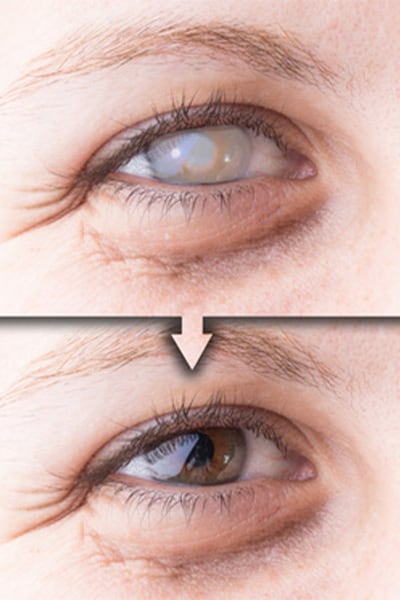Cataract surgery in Paris
Find out more about cataract treatments
What is cataract?
Intraocular lenses
What are the main steps of cataract surgery?
Find all Dr Rambaud’s videos on his Youtube channel.
@DocteurCamilleRambaud
Preparation before cataract surgery
- The evening before and the morning of the surgery, you must shower with Betadine, including your face and hair, which should be rinsed thoroughly.
- Do not wear makeup on the day of the operation and ensure you remove all makeup the evening before; avoid mascara for the three days preceding the procedure.
- You must fast for six hours before the operation: do not eat, drink, or smoke.
- If you wear contact lenses, remove them at least 48 hours before the surgery.
Arrival at the clinic
You will be admitted to a room in the outpatient surgery department. You must put on a gown and store your clothes securely in your room. Nurses will instill drops to dilate your pupil (mydriaticum).
Arrival in the operating room
Orderlies will escort you to the operating room, where the anesthesia and surgical nurses will prepare you by administering the first anesthetic drops and disinfecting your face with Betadine.
Entering the operating room
The nurses will position you on the operating table, lying on your back. You will have a warming blanket, and the anesthesiologist will monitor your blood pressure and place an intravenous line to administer immediate treatments if needed (for example, in case of high blood pressure or stress).
During the operation
A sterile drape is placed over your face, under which you receive oxygen to help you breathe comfortably. You will see a more or less colored light, with three bright points resembling stars, which you can look at without discomfort. The operation is painless and lasts only a few minutes. You may communicate with the surgical team during the procedure if needed.
How is cataract surgery performed?
The eye is kept open with a soft eyelid speculum. A 2.2 mm micro-incision and a smaller 1.2 mm incision are made. The cataractous lens is contained within a transparent sac called the capsule. The anterior part of the capsule is opened, and the cataract is removed using a machine called a phacoemulsifier, which breaks up the cataract with ultrasound and aspirates the fragments. The rest of the capsule is left intact to allow insertion of the artificial lens, which is implanted folded through the 2.2 mm incision and unfolds once inside the capsular bag. The micro-incisions are self-sealing and do not require sutures. At the end of the procedure, 1 mL of antibiotic is instilled into the eye to minimize the risk of postoperative infection, and the operation is complete.
After cataract surgery
The sterile drape is removed, and a transparent protective shield is placed over the operated eye. You will be escorted back to your room, where the nurses will offer you a snack. You may get dressed after the intravenous line is removed and leave the clinic once the administrative formalities are completed.
Postoperative care
You may return home the same day. Vision usually returns progressively within a few hours, sometimes within 24 to 48 hours. You must wear the transparent protective shield at night for one week but can remove it during the day. Postoperative treatment consists of eye drops to be used in the operated eye for one month. You will have a follow-up consultation with Dr. Rambaud the week after surgery.
Recovery after cataract surgery
- The operated eye may be watery for a few hours after the procedure and may be sensitive on the first postoperative day.
- Visual improvement is progressive during the first few days after surgery.
Glare after cataract surgery
- Glare and halos are common in the first few days after surgery.
- Cataract reduces vision and the amount of light entering the eye.
- After surgery, it takes a few days to readjust to normal brightness.
Precautions after cataract surgery
- You may resume your usual medications (including eye drops for ocular hypertension) the day after surgery.
- Reading and computer work are allowed from the day of the procedure, although some discomfort is normal initially.
- You may wear your glasses even if they are not adapted to your new vision in the operated eye.
- You can resume normal activities the next day.
- Driving is permitted after approval from Dr. Rambaud.
- Makeup is allowed one week after surgery.
- You may shower the day after surgery, avoiding water and rubbing the eyes.
- Sports, strenuous activities, and swimming are allowed three weeks after surgery.
Visiting the hairdresser after cataract surgery
- You can visit the hairdresser three days after the procedure.
Complications after cataract surgery
Complications are rare. Postoperative infection or endophthalmitis occurs in 0.32% of operated cataracts. The routine injection of antibiotics at the end of the procedure helps minimize this risk. Other, even rarer, complications include retinal detachment, macular edema (Irvine-Gass syndrome), and corneal edema. These complications most often occur in dense cataracts operated on too late.
Blurred vision after cataract surgery
In the first few days after surgery, vision returns progressively, and mild blurriness may occur. You will see Dr. Rambaud a few days after the procedure for a vision check and to ensure proper healing.
SICS: Surgery for very dense cataracts
CATARACT LASER EYE SURGERY : PRICES IN PARIS
Frequently asked questions about cataract surgery
Is cataract surgery covered by health insurance?
Cataract surgery is indeed covered by the French national health insurance. The procedure is reimbursed at 100%, but any extra fees remain the patient’s responsibility. Only monofocal lenses, which correct vision at a single distance, are fully covered. Partial reimbursement for more advanced lenses, such as multifocal implants, is possible. Some supplementary health insurance plans may also contribute to the cost of the procedure and implants. It is advisable to consult your health insurance provider after receiving a personalized estimate from your surgeon.
Is there a medication that can treat cataract and avoid surgery?
No. Surgery is currently the only effective treatment for cataract. While research is ongoing worldwide to find a purely medical solution, no medication has yet proven effective. Some recent animal studies suggest that certain eye drops could potentially prevent the molecular changes in the lens that cause cataract, but it will take many more years of research and regulatory approval before a medical treatment becomes available.
Book an appointment with Dr. Rambaud
Have a question? Ask Dr. Rambaud
This page was written by Dr. Camille Rambaud, an ophthalmologist based in Paris and a specialist in refractive surgery.



0 Comments